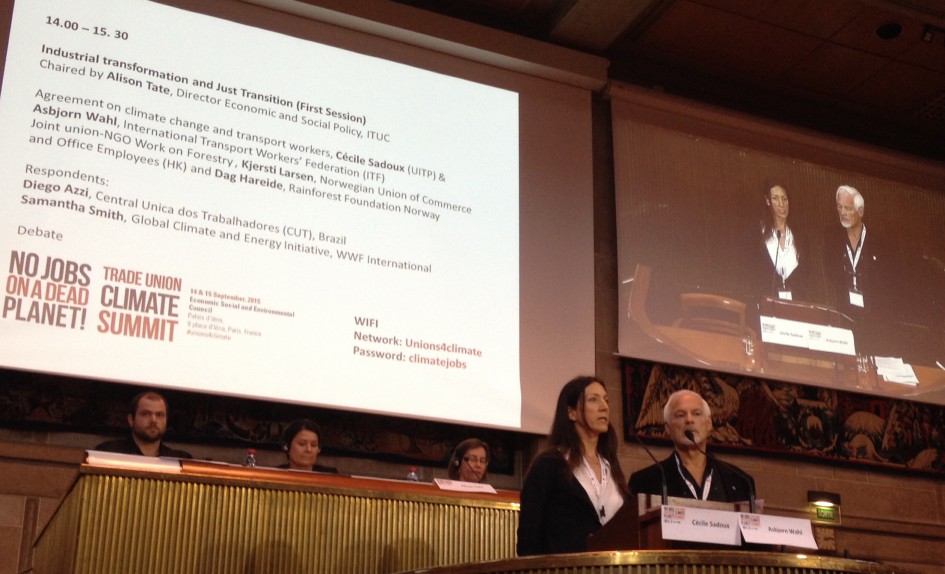Asbjørn Wahl, chair of the ITF working group on climate change spoke at the Trade Union Climate Summit in Paris this week (14-15 September)
Read the speech, share and comment!
“It is a pleasure and an honour for me to present to you a declaration on climate leadership, which has been negotiated between the UITP and the ITF. It was quite recently signed by the two general secretaries, Alain Flausch of the UITP and Stephen Cotton of the ITF, and the declaration is actually being published for the first time here today, at this Climate Summit. Through this joint declaration we are proving that we are united on many issues on how to fight against climate change, that we are prepared to play our role in this fight, and that we are fully supporting an ambitious programme to prevent climate change.
“The ITF represents 4.5 million transport workers in around 700 trade unions from 150 countries worldwide. At our Congress in Mexico in 2010, the ITF unanimously adopted a climate change policy, which at that time, and most probably still, is the most comprehensive, ambitious and progressive climate change policy in the international trade union movement. We developed a so-called whole economy approach, meaning that if we want to avoid catastrophic climate change, we have to go through a deep transformation of our economy, that means the way we produce, distribute and consume in our societies. In order to make workers, and people in general, support such a deep transformation, it has to be carried out in a way, which brings benefits to ordinary people. That is the reason why climate change policy will have to go hand in hand with a radical redistribution of wealth in our societies.
“Of course, the joint declaration with the UITP does not cover all our climate change policies, but focuses on the immensely important role that public transport can, and have to, play if we at all are going to succeed in fighting climate change. The declaration therefore states that “any global attempt at limiting global average temperature rise to less than 2oC without including transport sector will not be successful.”
“Our joint declaration is science-based, and we are prepared to do what is necessary to meet the goals set by science. We realise that the transport sector is one of the absolute biggest contributors of greenhouse gas emissions – already responsible for 23% of all emissions. If “business as usual” is allowed to continue, this will increase to 30% by the year 2030 and 75% by the year 2050 – with most of it coming from private vehicles. This has to change if we are to have any chance to avoid dangerous climate change. It is urgent, therefore, to take action. That is the reason why the declaration states that “now is the time to leverage the transformational power of sustainable transport”.
“If so, public transport has a key role to play. Even more than that, a massive expansion of public transport is quite simply unavoidable if we are to stay within the 2oC limit. The joint declaration therefore includes very ambitious goals; it reflects our impatience; it realises that we have to increase the pressure on politicians and other decision-makers; it promotes the avoid-shift-improve approach; it calls for increased investments in public transport infrastructure; it supports that subsidies should be eliminated from the fossil fuel industry.
“We also realise that climate change policies have to be seen in a broader perspective. Expanding public transport infrastructure and use also have to meet wider goals, “like the creation of millions of new, decent jobs, direct and indirect”. This is an important part of what we elsewhere characterize as climate jobs. It will also “help to provide better mobility for all”, as well as “improve the quality of life for all”.
“The declaration also clearly reflects that if we are to succeed with our joint climate change policies, workers interests have to be represented. It therefore states that: “As organisations in the transport sector, representing both employers and transport employees, we are ready to play our role. To that end, UITP and the ITF commit to working together and developing high standards of initial and vocational training, high standards of staff security, and developing formal employment and reducing informal employment to enhance public transport”.
“Of course, we from the trade union movement know from our experiences, that agreements and ambitions are one thing, concrete action another. At the end of the day, we know, that it is the balance of power in society, which will define the way we deal with this planetary crisis. Hard work, strong organisations and pressure from below will therefore be necessary if we are to meet our goals. We are prepared to develop such pressure, through increased activity and trade union action. That is also the reason why we call on our affiliated unions in public transport to take climate change action on 5 October, as a part of the ITF annual Week of Action, in order to increase the pressure up to COP21.
“To summarise, we appreciate very much that we have been able to develop this declaration jointly with the UITP. Together we strongly agree on the need to expand public transport. We strongly agree that we have to promote and protect the interests of transport workers in this process. And we strongly agree that now is the time to take action – there is no time to lose. We need to expand public transport, we need the millions of decent, climate jobs that this will bring us, and we need to put pressure on politicians and other decision-makers to make it happen. The joint declaration is meant to be a tool, which will help us achieve that – up to COP 21 and beyond.”
Find out how you can be part of the climate crisis solution on climate action day, 5 October

Leave a Reply